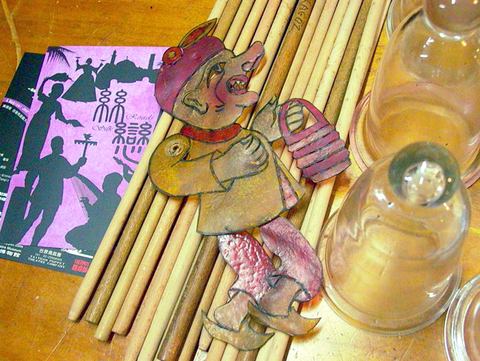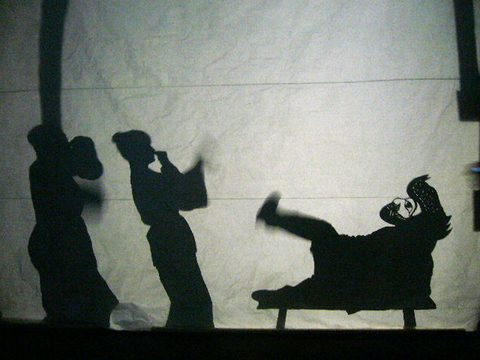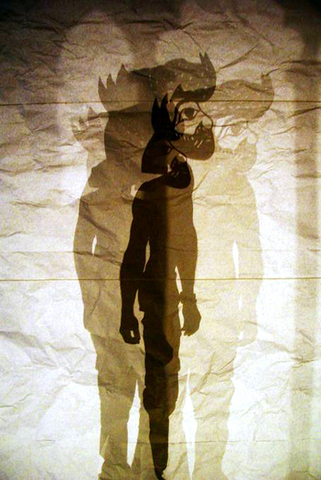At a small theater on Taipei's west side, Taiwan's foremost puppeteer Chen Xi-huang (陳錫煌) adds a few finishing touches to his glove puppets while the Turkish shadow puppet master Cengiz Ozek discusses how to present the show with stagehands and Robin Ruizendaal, art director of Taiyuan Puppet Theater Company (台原偶戲團).
Fittingly, the international collaboration is about an adventure on the silk road, the ancient cultural highway linking Asia and Europe, as artists and musicians from Taiwan, Turkey and the US contribute their inspiration to the interdisciplinary production combining Taiwan's glove puppet and Turkish shadow puppet theaters, live performances and large shadow screen performances directed by Larry Reed, founder of the Shadowlights Company of San Francisco. (see story below.)
Silk Road (絲戀) tells of the story of two sisters traveling through the silk road from China to Istanbul to find a magical harp that charms silkworms to produce the most beautiful colored silk in the world. From mountain, desert to oasis and spice fair, the girls encounter all kinds of exotic animals, magicians, human traffickers, belly dancers, poets, sages and hobgoblins on their journey.

PHOTOS COURTESY OF TAIYUAN PUPPET THEATER COMPANY
To Ruizendaal and Ozek, the show is a theatrical celebration and exploration of the ancient cultural exchanges that have left an indelible imprint on today's world. "One of my key interests for the play is to see the shared affinity of puppetry traditions in China, Turkey, Egypt and Taiwan," said Ozek, art director of Istanbul International Puppet Festival.
A unique and innovative experiment, the production is presented on three stages, one designed for actors, the other two for glove and shadow puppetry. Reed builds on this with his light show, that creates a world of amazing shadows, overlapping images and the illusion of depth.
As for the music, Taiwan's award-winning composer Li Che-i (李哲藝) will team up with Turkish musicians Binnaz Celik and Gunay Celik to stage live performances of the original score mixing Turkish folk songs and traditional Chinese music.

"Our biggest challenge is to integrate all the diverse elements into one coherent play," said Ruizendaal, adding that the production is a first-time attempt to every one involved.
Also new is the ensemble's attempt to offer a lively introduction to the ancient theatrical tradition in Turkey, its exquisite marionettes made out of camel skin and the beloved puppet figure Karagoz, a playful jester who undergoes different transformations in different stories that come from the grassroots culture as a manifestation of the people's voices, ideas and lives.
Having studied shadow puppet theater since age 11 and played Karagoz for the past 30 years, Ozek is excited to bring life to his favorite character not only through his accomplished puppetry art but as a real human performance on the stage. "I always feel myself as Karagoz. In the shadow puppet theater, I am connected with Karagoz with two sticks, but now for the first time, I am Karagoz," said Ozek, who will bring this creative production to Istanbul International Puppet Festival in May.



William Liu (劉家君) moved to Kaohsiung from Nantou to live with his boyfriend Reg Hong (洪嘉佑). “In Nantou, people do not support gay rights at all and never even talk about it. Living here made me optimistic and made me realize how much I can express myself,” Liu tells the Taipei Times. Hong and his friend Cony Hsieh (謝昀希) are both active in several LGBT groups and organizations in Kaohsiung. They were among the people behind the city’s 16th Pride event in November last year, which gathered over 35,000 people. Along with others, they clearly see Kaohsiung as the nexus of LGBT rights.

Jan. 26 to Feb. 1 Nearly 90 years after it was last recorded, the Basay language was taught in a classroom for the first time in September last year. Over the following three months, students learned its sounds along with the customs and folktales of the Ketagalan people, who once spoke it across northern Taiwan. Although each Ketagalan settlement had its own language, Basay functioned as a common trade language. By the late 19th century, it had largely fallen out of daily use as speakers shifted to Hoklo (commonly known as Taiwanese), surviving only in fragments remembered by the elderly. In

Dissident artist Ai Weiwei’s (艾未未) famous return to the People’s Republic of China (PRC) has been overshadowed by the astonishing news of the latest arrests of senior military figures for “corruption,” but it is an interesting piece of news in its own right, though more for what Ai does not understand than for what he does. Ai simply lacks the reflective understanding that the loneliness and isolation he imagines are “European” are simply the joys of life as an expat. That goes both ways: “I love Taiwan!” say many still wet-behind-the-ears expats here, not realizing what they love is being an

In the American west, “it is said, water flows upwards towards money,” wrote Marc Reisner in one of the most compelling books on public policy ever written, Cadillac Desert. As Americans failed to overcome the West’s water scarcity with hard work and private capital, the Federal government came to the rescue. As Reisner describes: “the American West quietly became the first and most durable example of the modern welfare state.” In Taiwan, the money toward which water flows upwards is the high tech industry, particularly the chip powerhouse Taiwan Semiconductor Manufacturing Co (TSMC, 台積電). Typically articles on TSMC’s water demand